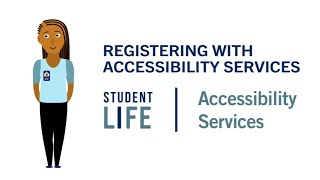Accessibility, Accommodations, and Advising
Hey Innis! With midterms over, it is time, once again, to start dreading finals. Regardless if they are exams or ten-page essays, they suck the life out of us students and fill us with worry and crippling stress. For some, this intense period may cause procrastination or a mid-program crisis that puts dropping out of university on the table. For the many students with a disability, however, this period may end with an anxiety attack, seizures, and a lot of physical pain.
As a fourth-year student with a disability, I know Accessibility Services like the back of my hand. Let’s just say I have a lot of advice to share for my fellow first years and anyone who is new to accessibility at U of T.
I hope this overview of services will convince you to take advantage of them so you’ll feel more prepared to tackle your future final examinations with more confidence!
Definitions and myth busting
“Accommodations” are not special treatment. Rather, they are simply tools to allow a student to participate in the classroom when they otherwise would not be able to. I know a lot of students who assume that their medical issue is not severe enough to be considered a disability. But “disability” doesn’t always impact a person every waking moment. There will be good days and eventually bad days. And for those days, having an accommodation helps.
Register with Accessibility Services
If you feel that your disability is interfering with your ability to do well academically—or would appreciate a bit of help here and there, especially for your exams—I strongly suggest you register with Accessibility Services. They can provide accommodations specific to your disability.
In addition to peer note-taking, extensions, reserved seating, and other in-class accommodations, they also help provide accommodations for your examinations! These may include: extra time, breaks, private rooms for exams, extensions for essays, and rescheduling to avoid having two exams on the same day.
To register with accessibility services, here is the three-step process:
Collect your medical information. Download and complete the Certificate of Disability Have a doctor sign the document.
Fill out the Student Intake Form.
Schedule and attend your intake appointment with your new accessibility advisor. Before your meeting, reflect on how your disability impacts your academics.
It will take time to apply, especially during the registration period before exams, so register as soon as possible! To register you can check the Accessibility Services registration page, or watch this YouTube video breaking down all of the steps in more detail.
If you have any questions, sign up for a Peer Advisor Drop-In Session, send them an email at accessibility.services@utoronto.ca, give them a call at 416-978-8060, or visit their office in person at 455 Spadina Avenue.
Once you have your Letter of Accommodation, don’t forget to follow up on the services:
Register for exam accommodations
First, sign into the Accessibility Services Portal where you have access to your accommodation letters, volunteer note-takers’ notes, and, most importantly, midterm and final exam registration. Double check with the Accessibility Service portal or office for the registration deadline for next term’s midterm and finals. If you miss that deadline, there is an alternate registration form. Just note: those who register late are not guaranteed to get their accommodations. If that happens get in touch with your accessibility advisor and speak to your professors to discuss potential emergency accommodations.
Attend a study session
Accessibility Services host a variety of programs for their registered students.
Their Group Learning Strategy Sessions give you tips and techniques to study more effectively and offer you a study group to keep you motivated while preventing burnout.
Attend Virtual Accountability Check-ins
Held twice a week, Virtual Accountability Check-ins encourage you to remain grounded in your studies, provide you focus for your tasks and upcoming assessments, and give you a safe space to be real about what you are going through.
Overall, this information is just the tip of the iceberg. Accessibility Services offers more than providing accommodations and ensuring an accessible experience at UTSG; they also do their best to serve you and set you up for academic and career success.
If you are not registered yet, consider signing up. There is still time for applications for the next term. If you’ve already registered, I strongly encourage you to explore their many programs.
I wish you all the best on your finals!
